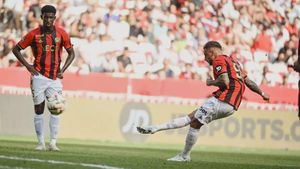Starbucks Corporation has made headlines recently with the announcement of CEO Brian Niccol's staggering compensation package, valued at $96 million for just four months on the job. Niccol, who assumed his role on September 9, 2024, is now enjoying one of the most lucrative pay packages among top executives, beating out tech giants Tim Cook and Sundar Pichai, whose compensation structures have been under scrutiny as well.
According to reports, 94% of Niccol's compensation came from stock awards, reflecting the company board's serious intentions to incentivize and retain his leadership amid challenging times. Commenting on his appointment, Starbucks noted, "Our fourth quarter performance makes it clear we need to fundamentally change our strategy so we can get back to growth, and that's exactly what we are doing with our ‘Back to Starbucks’ plan." Niccol's pay package includes stock tied to performance metrics and vesting over three years, which means his earnings are contingent on the company's future successes.
Despite the high pay, questions loom large over Niccol's effectiveness so far. His short tenure has been marked by struggling sales numbers. During the last reported quarter, comparable store sales dropped 7%, with revenue declining by 3% to $9.1 billion. Earnings per share also took a significant hit, falling 24% to $0.80, raising alarms not only among investors but among employees and customers alike.
Starbucks' significant challenges have primarily arisen from its largest markets—sales fell 6% across U.S. stores and plummeted 14% in China. Many analysts have recognized these financial metrics highlight not just market pressures, but questions about operational integrity and customer engagement.
Upon taking on his position, Niccol outlined ambitious plans aiming at restoring the brand to its roots as a comforting community coffeehouse. He emphasized the necessity of empowering store workers to provide exceptional service and re-establishing the company as a venue for community interactions. He stated, "Starbucks has to become a welcoming coffeehouse where people gather and where we serve the finest coffee, handcrafted by our skilled baristas." Niccol's vision aligns closely with historical consumer sentiment—which often called for Starbucks to resonate as more than just another coffee shop.
To implement his turnaround strategy, Niccol hinted at significant changes within the company’s workforce. Recently, he communicated intentions to cut Starbucks’ number of employees by March, acknowledging the necessity for operational efficiencies. Many employees expressed confusion and concern over potential layoffs and restructuring.
Despite drastic changes looming on the horizon, Niccol is also focused on improving service speed, aiming for customers to receive their orders within four minutes as part of his strategy. This focus on operational efficiency aligns with similar initiatives across the industry, where service quality continues to directly affect customer retention and sales.
Underlying the board's determination to retain Niccol is his past success at Chipotle Mexican Grill, where he previously served as CEO. His leadership reportedly transformed Chipotle’s operations, driving stock performance and customer growth. Nevertheless, the question remains whether those achievements can be replicated with Starbucks, especially considering Niccol's $96 million compensation package puts immense pressure on his ability to deliver tangible results very quickly.
While Starbucks' stock showed initial positive reactions to Niccol's appointment, it has remained flat since, emphasizing the concern of investors who are now eagerly waiting for signs of recovery or strategic clarity from the new CEO. Financial results will need to demonstrate marked improvements soon, or the initial excitement surrounding his hiring could fade rapidly.
Industry experts have varied opinions on the appropriateness of Niccol’s pay package at such precarious times for Starbucks. While some argue competitive compensation is necessary for attracting high-caliber talents, others voice reservations about perceived excess during challenging economic periods—highlighting broader trends within corporate governance and the responsibility of public companies to their stakeholders.
Overall, Niccol’s unique arrangement—which also allows him to work part-time from Newport Beach, California, requiring the use of private jets—marks new discussions around top executive compensation practices, especially within large organizations facing public and investor scrutiny.
The significant financial product offered to Brian Niccol marks both opportunity and responsibility. He must now navigate steep operational hurdles and setting Starbucks back on the path to profitability, all under the watchful gaze of investors and customers who expect substantial returns on their future investments—both emotionally and financially.



